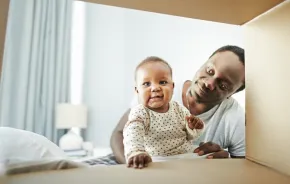 Has becoming a parent turned you into a neat freak? It happens to the best of us. Take house cleaning, for example: How many parents, prior to bringing home a newborn babe, felt it necessary to sterilize everything? But with a new baby in the house, every speck of dirt becomes a hygiene enemy — one that must be removed from all surfaces that come in contact with our newborn.
Has becoming a parent turned you into a neat freak? It happens to the best of us. Take house cleaning, for example: How many parents, prior to bringing home a newborn babe, felt it necessary to sterilize everything? But with a new baby in the house, every speck of dirt becomes a hygiene enemy — one that must be removed from all surfaces that come in contact with our newborn.
That quest to create a clean, germ-free environment probably stems from the powerful instinct to protect our young. But is germ-free really ideal?
Germs and the immune system
A germ is a microorganism. It can be bacterial or viral, and some germs can cause illness, which causes concern for parents (especially new ones). But in recent years, researchers have discovered that some bacteria are beneficial — and even necessary — for our bodies to build up defenses through our immune system. This is why pediatricians are less likely to prescribe antibiotics as freely as they did in the past; as drugs kill bacteria, they also kill friendly flora that are useful for maintaining healthy bodies.
Dr. Fernando Vega, a family physician at Seattle Healing Arts and assistant professor at the University of Washington, says it’s sometimes best to avoid antibiotics. “Many doctors do not prescribe antibiotics as a first course of action for ear infections,” he says. “It has been shown that more than 80 percent of all ear infections resolve spontaneously without antibiotics. We know that the majority of children with fever or pain resolve in 24 hours with or without antibiotics.” But for children with high fevers or for those who’ve had pain for more than 24 hours, Vega says, antibiotics may help shorten the course of symptoms.
Newborns have a higher risk of developing serious problems when they catch the common cold or flu, despite a natural advantage from the new mom. “A newborn has the advantage of some help from the mother’s immune system called ‘passive immunity’ during the first several months of life,” says Dr. Catherine Karr, who is with the Department of Pediatrics at the University of Washington. “A baby’s own immune system develops slowly and is less able to keep infections under control in the first few months.” So if a newborn younger than 8 weeks old gets a fever, physicians sometimes feel obligated to do a thorough workup, Karr says, which could include a spinal tap and urine catheterization, to make sure things don’t get serious. “These are such invasive procedures that are distressing for babies and parents,” Karr says. “So parents should be particularly careful with protecting their young newborn from coming in contact with people who are sick.”
Minimize exposure to germs
If you’ve got a newborn, infant or child with a compromised immune system, experts say there are a number of steps you can take to reduce exposure to germs — and lower the risk of catching and spreading illnesses.
1. Limit your infant’s exposure to other people who may be carrying germs. Avoid taking newborns to public places until they are 2 months old. Encourage people who visit to wash their hands before they handle your baby.
2. Develop a regular hand-washing habit, and teach your child to do the same when he’s old enough.
3. If your child is sick, keep him at home. Most child-care centers as well as parent-tot classes have an illness policy. Find out what it is and follow it faithfully. It’s much better to err on the side of caution when it comes to your child’s health and the risk of spreading germs and illnesses.
4. Limit your infant’s exposure to germs in public places. Popular baby products, such as shopping-cart seat covers, help create a shield between objects that can be germ magnets.
5. Make sure you feed your child a well-balanced diet. Once your baby is eating solid foods, experiment with a variety of fruits and vegetables.
6. Talk with your pediatrician about the pros and cons of immunizations and vaccines, including flu shots, and develop a strategy for how you want your child to be immunized.
Take the white gloves off
For most parents, the pledge to maintain a germ-free household of hygiene fades over time as their child moves into toddlerhood. It is true that newborns and infants are more susceptible to catching colds and viruses; after all, babies have less-developed immune systems and tend to put things in their mouths. But once your baby becomes mobile and begins exploring her world, try to relax a bit and become more comfortable with germs. Scientists say some exposure to germs is necessary for healthy development. Coined the “Hygiene Hypothesis,” this theory suggests that babies’ immune systems cannot “harden” or develop properly if germs are completely removed from their environment. And some scientists say children who are exposed to germs early in life develop immune systems with tolerance for the irritants that otherwise could cause allergic and asthmatic symptoms.
“My motto is that I keep my house clean enough to be healthy but dirty enough to be happy,” says Rose Earl-Kolev, Seattle mother of two girls, ages 5 and 7. “So, yes, I tell my daughters to wash their hands before they eat, or after they dig around in the garden, or play with bugs. But I encourage them to play and get dirty.”
Lori Goff is a parent coach, preschool teacher, and mother of a 4-year-old daughter. She can be reached at pwmweb.org.









